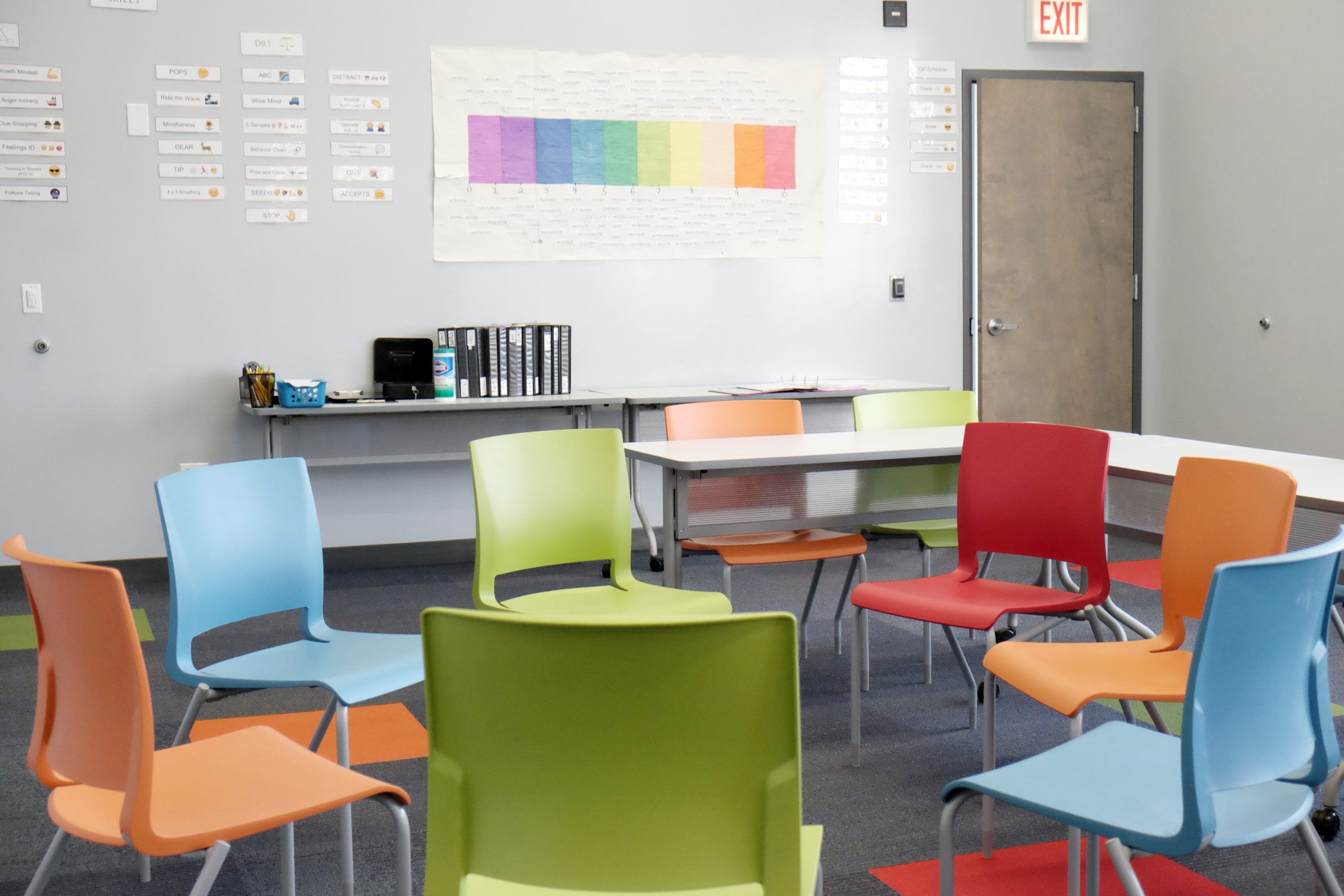School Refusal
Compass Health Center’s treatment teams offer specialized mental health care and support for children and adolescents struggling with school anxiety and refusal behavior. Our individualized programming focuses on equipping participants and their families with the necessary skills to effectively manage mood and anxiety symptoms that arise in response to general daily stressors and those that may affect a child's ability to attend school successfully.
Schedule an Appointment Why Treatment Length Matters
What Is School Refusal?
School refusal, also known as school avoidance, is a challenging behavioral pattern in which a child consistently avoids attending school. It goes beyond occasional resistance or typical school-related stress and becomes a persistent issue that significantly impacts a child’s daily life and educational progress. The underlying reasons for school refusal can be complex, including anxiety, depression, social difficulties, bullying, family issues, or even positive reinforcement, where children refuse school to gain something they desire.
It’s essential to recognize that school refusal is not a result of laziness; rather, it reflects emotional distress or other psychological challenges. Early identification and intervention are vital to address the root causes and help the child overcome their avoidance behaviors.
At Compass Health Center, we understand the complexities of school refusal and offer specialized treatment programs to support children and adolescents facing these difficulties. Our experienced team of mental health professionals provides comprehensive assessments, group, individual, and family therapy, and skill-building strategies to address the underlying issues contributing to school refusal behavior. Through our evidence-based approaches, we aim to empower children to overcome their anxieties, develop coping mechanisms, and return to or begin experiencing a positive and successful school experience.

Recognizing and Treating School Refusal Symptoms: A Guide for Parents
Recognizing the common symptoms of school refusal is crucial in providing appropriate support and interventions for children struggling with this issue and reintegrating successfully into the school environment. Children with school refusal may frequently complain of physical ailments, such as stomach aches, headaches, or sore throats, particularly when it’s time to go to school. These physical complaints tend to subside once they are allowed to stay home, only to resurface the following morning or on school days.
Another common sign of school refusal is the repeated request to visit the nurse’s office, using it as an excuse to escape the classroom environment. This behavior may provide temporary relief from the stressors associated with school.
In some cases, students might exhibit frequent tardiness or even skip school altogether to avoid facing the challenges that trigger their anxiety. They might strategically be absent on test days or during events that provoke performance anxiety, such as giving presentations or participating in sports.
At Compass Health Center, our expert team specializes in treating school refusal and provides tailored interventions to help children overcome these challenges and thrive academically and emotionally. Our evidence-based approaches empower children to build resilience, develop coping mechanisms, and navigate the school environment with confidence. If you notice signs of school refusal in your child, don’t hesitate to reach out to us for specialized care and compassionate support.
Symptoms of school refusal may include:
- Temporary stomachache, headache, or other somatic symptoms
- Frequent visits to the nurse’s office
- Frequent tardiness
- Performance anxiety in tests, presentations, sports, or other activities

Effects of School Refusal on Your Child's Life
School refusal can profoundly affect a child’s life, resulting in a range of negative consequences that extend beyond the classroom. Addressing school refusal promptly is essential to mitigate these effects and support your child’s overall well-being.
One of the primary consequences of school refusal is academic difficulties. When a child consistently misses school or struggles to stay in class, their educational progress is hindered. Missed lessons and assignments can lead to gaps in knowledge, falling behind peers, and a decline in academic performance. These challenges can further erode a child’s confidence and motivation to engage in learning.
School refusal also strains relationships with peers and teachers. Chronic absenteeism can make it difficult for children to form and maintain friendships, leading to feelings of isolation and social exclusion. Additionally, strained interactions with teachers can create a negative classroom environment, hindering learning and exacerbating the child’s aversion to attending school.
A child experiencing school refusal may also suffer from decreased self-esteem. They may feel ashamed or embarrassed about their inability to attend school regularly, leading to a negative self-perception and a sense of inadequacy compared to their peers. This can have lasting effects on their overall self-confidence and self-worth.
Furthermore, school refusal can impede social development. Regular school attendance provides opportunities for children to develop social skills, learn to navigate relationships, and engage in cooperative activities. When school refusal disrupts these opportunities, children miss out on important developmental experiences that are crucial for their growth and well-rounded development.

Comprehensive School Refusal Treatment at Compass Health Center: Evidence-Based Approaches and Collaboration
Recognizing when to seek treatment for school refusal is crucial for addressing the issue effectively. If your child consistently avoids or refuses to go to school, experiences significant distress or anxiety related to attending school, or shows a decline in academic performance due to school avoidance, it may be time to seek professional help. It is important to seek treatment promptly to prevent the negative consequences of prolonged school refusal, such as falling behind academically, strained relationships with peers and teachers, decreased self-esteem, and limited social development. A mental health professional specializing in child and adolescent psychology can assess your child’s specific situation and provide appropriate guidance and interventions.
Compass Health Center employs evidence-based therapies, counseling, and skill-building exercises to empower young individuals to overcome their school refusal challenges and create a path towards academic and social success. Our multidisciplinary approach ensures that we address the underlying factors contributing to school refusal and provide holistic support. In this program, children engage in “school-anxiety related exposures,” such as raising their hand, reading out loud in front of a class, asking a teacher for help, and more during program as means to prepare for the return to school.
Our treatment programs focus on equipping children with the necessary tools and strategies to effectively manage their anxiety, stress, and other emotional difficulties that arise in the school environment. We help them develop coping skills, resilience, and self-confidence, enabling them to navigate daily stressors and academic demands with greater ease.
Collaboration and communication with families, schools, and other relevant stakeholders is a priority. We work closely with parents, educators, and school personnel to create a supportive network that fosters a positive school experience for the child. By establishing open lines of communication, we ensure that everyone involved is on the same page and actively working towards the child’s success.
Contact us today to talk to one of Compass Health Center’s intake specialists to learn more.





